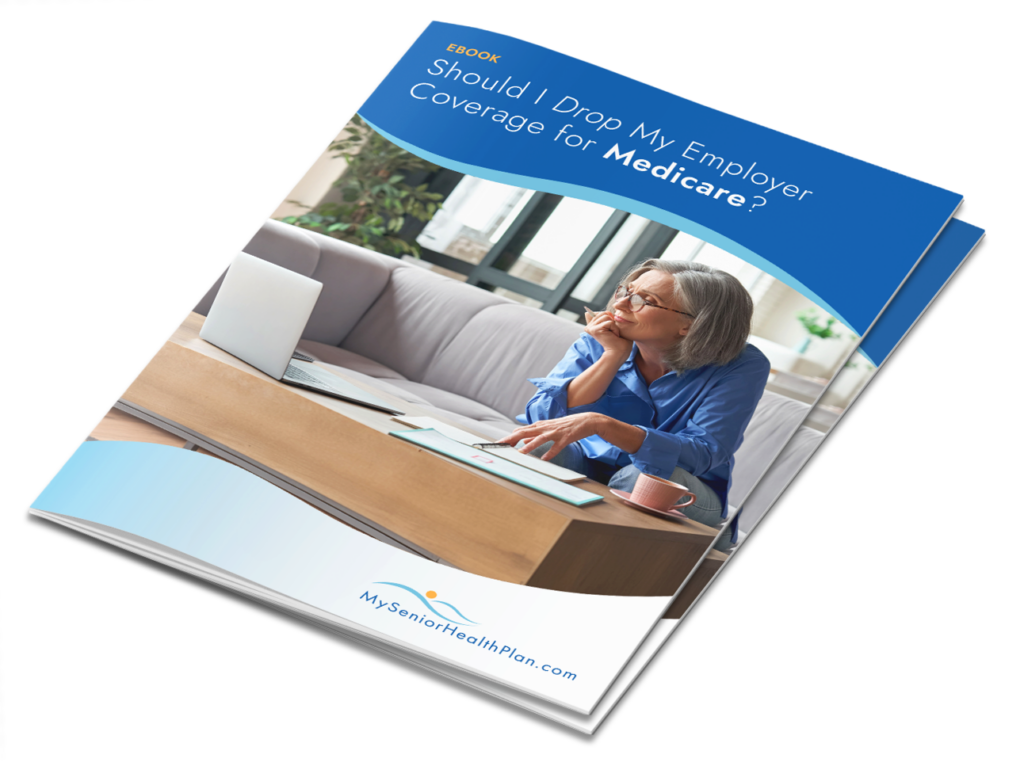Can I Drop My Employer Health Insurance For Medicare?

For many seniors, determining the right health insurance plan involves asking about the value of employer health insurance compared to Medicare. You may be turning 65, but that doesn’t mean you’re retiring, which leaves many seniors wondering what they should do.
Can I drop my employer health insurance for Medicare?
The short answer is yes, you can drop your employer health insurance for Medicare. But a complex set of factors can make this decision complicated.
You don’t have to leave your employer health insurance and sign up for Medicare when you turn 65, especially if you have no plans to retire in the near future. But you need to consider all your options. We can help you determine if dropping your employer health insurance to get Medicare is the right decision for you.
Option 1. Drop employer benefits and enroll in Medicare
Before you leave your employer’s plan, find out what benefits your current health plan includes that Medicare does not. For instance, employer health insurance plans might cover routine dental appointments and prescription drug costs, whereas Medicare Parts A and B don’t.
For example, if you let go of your employer health insurance, you should consider adding Medicare Part D or a Medicare Advantage Plan. But bear in mind, Medicare Part D can be expensive.
And remember, Medicare only covers individuals, not spouses and dependent children. So if you support a family, your employer health insurance might be worth keeping.
On the other hand, you might want to switch to Medicare if you think you’ll lose your employer health insurance in the future. Or, you may work for a smaller company that requires employees over 65 to sign up for Medicare to reduce costs.
Option 2. Combine employer insurance and Medicare
If you like your employer health insurance, you can actually “coordinate” benefits between your employer insurance and Medicare. To do this, you’ll have to enroll in a Medicare Advantage Plan.
When you sign up for Medicare, list your employer insurance on the Initial Enrollment Questionnaire (IEQ) when applying for a plan. Medicare determines which insurance (employer-provided or Medicare Advantage) will be your primary payer based on the size of your company.
If you do want to stick with your employer insurance, you should still sign up for Medicare Part A. Medicare Part A offers benefits unique to seniors—like hospice care—and has no premium fee. So you can take advantage of Medicare Part A’s benefits at no additional cost.
Option 3. Keep your employer plan and enroll in Medicare later
You can remain on your employer insurance and sign up for Medicare when you retire. But when you delay, you may be subject to late fees due to postponing your enrollment.
If you don’t sign up for Medicare Part B within your Initial Enrollment Period (IEP), Medicare will charge a 10% premium increase for every additional 12 months you delay enrollment.
But seniors covered by group employer health insurance are eligible for the Special Enrollment Period (SEP). The SEP lasts eight months and allows you to sign up for Medicare after your IEP without being penalized.
If you don’t qualify for the SEP, sign up for Medicare Part B during your IEP to avoid the fee.
Get Our Free eBook: Should You Drop Your Employer Health Insurance for Medicare?

This comprehensive guide is specifically designed for seniors who are still actively employed and facing the challenge of choosing the right health coverage. The eBook offers a detailed breakdown of the options available, including the pros and cons of both employer health insurance and Medicare.
But we don’t stop at information alone—the final section includes practical worksheets that allow you to compare your current coverage with Medicare, step by step. These interactive exercises are crafted to help you make an informed, personalized decision that ensures your healthcare needs are fully met.
Why Download This eBook?
- In-Depth Guidance: Understand how Medicare interacts with employer health coverage and the potential costs.
- Actionable Worksheets: Take yourself through an easy-to-follow exercise to determine which option is best for you.
- Avoid Penalties: Get clear on Medicare enrollment deadlines to avoid costly penalties down the road.
The choices you make at this stage are essential for securing your future healthcare, and we’re here to help. Download the eBook now to ensure you’re making the best decision for your individual needs.
What are you going to do when you turn 65? If you’re unsure, connect with us at 877.255.6273. We can help you answer these critical healthcare questions.
image credit: shutterstock/Route 77
- How Medicare Advantage Plans Cover Seniors’ Vision, Hearing, and Dental Needs - October 29, 2024
- 2025 Medicare Part D Changes: How to Save on Prescriptions - October 25, 2024
- Everything You Need to Know About the 2025 Medicare Changes and How They Affect You - October 21, 2024

